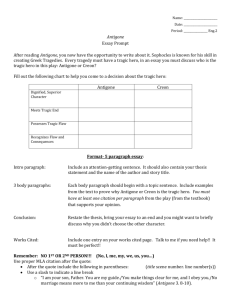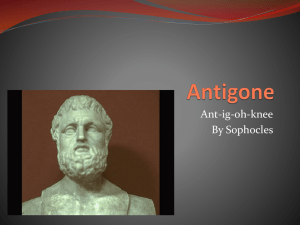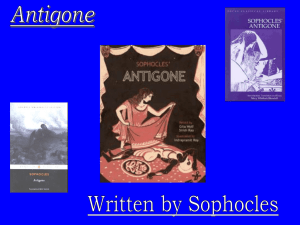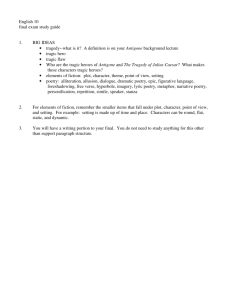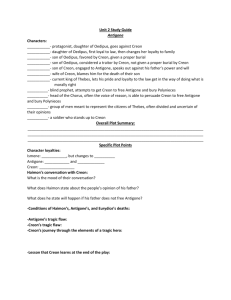File - Ms. Guilford's Classroom
advertisement
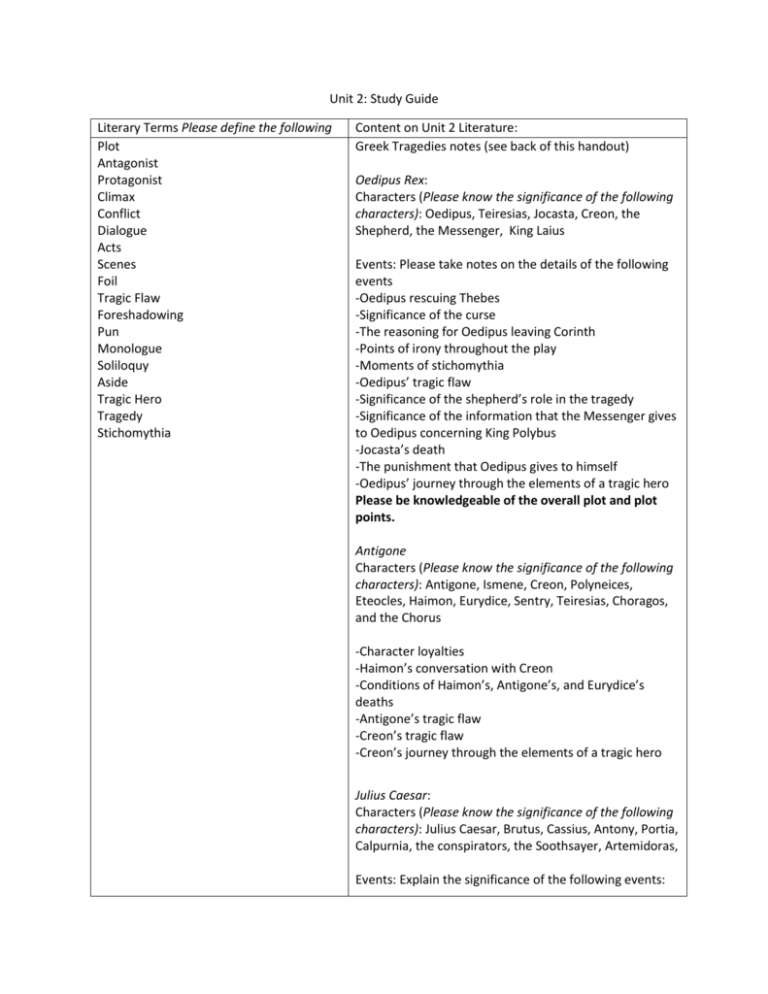
Unit 2: Study Guide Literary Terms Please define the following Plot Antagonist Protagonist Climax Conflict Dialogue Acts Scenes Foil Tragic Flaw Foreshadowing Pun Monologue Soliloquy Aside Tragic Hero Tragedy Stichomythia Content on Unit 2 Literature: Greek Tragedies notes (see back of this handout) Oedipus Rex: Characters (Please know the significance of the following characters): Oedipus, Teiresias, Jocasta, Creon, the Shepherd, the Messenger, King Laius Events: Please take notes on the details of the following events -Oedipus rescuing Thebes -Significance of the curse -The reasoning for Oedipus leaving Corinth -Points of irony throughout the play -Moments of stichomythia -Oedipus’ tragic flaw -Significance of the shepherd’s role in the tragedy -Significance of the information that the Messenger gives to Oedipus concerning King Polybus -Jocasta’s death -The punishment that Oedipus gives to himself -Oedipus’ journey through the elements of a tragic hero Please be knowledgeable of the overall plot and plot points. Antigone Characters (Please know the significance of the following characters): Antigone, Ismene, Creon, Polyneices, Eteocles, Haimon, Eurydice, Sentry, Teiresias, Choragos, and the Chorus -Character loyalties -Haimon’s conversation with Creon -Conditions of Haimon’s, Antigone’s, and Eurydice’s deaths -Antigone’s tragic flaw -Creon’s tragic flaw -Creon’s journey through the elements of a tragic hero Julius Caesar: Characters (Please know the significance of the following characters): Julius Caesar, Brutus, Cassius, Antony, Portia, Calpurnia, the conspirators, the Soothsayer, Artemidoras, Events: Explain the significance of the following events: Greek Tragedy Notes: Aristotle’s 3 Unities Unity of Place: a play should be set in only one location. Unity of Time: a play should only represent the happenings of one day; the events of the past are recounted by characters. Unity of Action: only actions and scenes relating to the main plot should be included; any unnecessary subplots should be omitted. • • • • HAMARTÍA—the mistake or misjudgment made by a character that leads to their downfall; the word literally means something like "missing the mark" because usually one makes their fatal mistake based on an incomplete self knowledge HUBRIS—a common form of hamartia. Hubris is the “pride” or overwhelming self-confidence which leads a protagonist to disregard a warning from the gods or to violate an important law. CATHARSIS—the audience’s reaction at the end of the tragedy; the feeling of acceptance that while sad; it ended as it had to end; the audience recognizes their gratitude that they were not the one’s in the tragic hero’s shoes that day DEUS EX MACHINA – “god from the machine.” In classical Greek theatre, a god lowered from a crane at the end of the play (as if from heavens), usually to resolve the action of the play. -The celebration at the beginning of the play -Caesar refusing the crown -The warning given to Caesar -The murder of Caesar -Significance of “Et tu, Brute?” -Antony’s funeral speech -Brutus’s funeral speech -Crisis point: Caesar’s death and funeral -Climax: Brutus’ death -Antony’s final comments about Brutus



